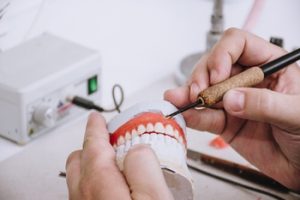For many people with missing teeth, the ability to wear dentures all the time, without constant removal or discomfort, can significantly improve their quality of life. But is it really possible to have dentures that you can wear all the time? And if so, what are your options? This blog explores modern denture solutions, how they compare with conventional options, and how implant-supported designs are changing how people think about false teeth.
Can You Really Wear Dentures All the Time?
The short answer is yes. Some dentures are specifically designed to be worn all the time. However, not all dentures are created equal. Traditional removable dentures are meant to be taken out at night to allow your gums to rest and to prevent issues such as gum irritation and accelerated bone loss.
However, advancements in dental technology, especially the integration of dental implants, have introduced secure, non-removable solutions like implant-supported dentures and hybrid dentures. These options provide increased stability, better oral health outcomes, and greater convenience for patients who want dentures that they can wear all the time.
The Problem With Conventional Dentures
 Conventional dentures, also known as traditional removable dentures, rest on top of the gums and are typically held in place using suction, denture adhesives, or metal clasps. While they remain a widely-used solution, especially in older patients, they come with several drawbacks:
Conventional dentures, also known as traditional removable dentures, rest on top of the gums and are typically held in place using suction, denture adhesives, or metal clasps. While they remain a widely-used solution, especially in older patients, they come with several drawbacks:
- They can slip or shift while eating or speaking.
- They often reduce bite force and chewing efficiency.
- Over time, they may contribute to increased bone loss in the jaw.
- They must be removed daily for cleaning and for the gums to recover.
Because they don’t stimulate the jawbone like natural teeth or implants do, conventional dentures cannot prevent the gradual deterioration of facial structure or support strong biting power over time.
Implant-Supported Dentures: A Secure Alternative
If you’re looking for dentures you can wear all the time, implant-supported dentures offer a far more secure and long-term solution. These dentures are anchored to the jawbone using dental implants that are surgically placed into the bone. This approach delivers enhanced stability, functionality, and confidence.
Depending on the type, implant dentures may be:
- Fixed (non-removable): As a permanent solution, they’re attached to implants; only a dentist can remove them.
- Removable (implant-retained): Snapped into place on implant abutments but can be taken out by the patient for cleaning.
Because they distribute biting forces more naturally across the jaw, implant dentures help preserve bone density and enhance your comfort when chewing and speaking.
The Difference Between Implant-Retained and Implant-Supported Dentures
Though these terms are often used interchangeably, they describe slightly different systems:
- Implant-retained dentures are held in place by implants but still rest partially on the gums. They can be removed for cleaning but offer more security than conventional dentures.
- Implant-supported dentures are fully anchored by implants and typically designed to be worn all the time. These are more stable, more comfortable, and better for long-term oral health.
Both dental prostheses reduce the need for adhesives, enhance chewing ability, and preserve the jawbone, but only supported types offer full-time wear.
Fixed Dentures and Hybrid Designs
One of the most advanced forms of dentures that you can wear all the time is the hybrid denture, which is a cross between a traditional denture and a fixed bridge. These are screwed into four implants (or more, depending on the case) and can replace the entire arch of missing teeth.
 Hybrid dentures:
Hybrid dentures:
- Offer permanent tooth replacement.
- Can be worn continuously, even while sleeping.
- Preserve facial muscles and prevent accelerated bone loss.
- Provide a natural look and feel close to your original teeth.
- Are ideal for patients seeking a perfect solution to edentulism.
These dentures are individually crafted to match your smile and bite, restoring both function and confidence.
What About Partial Dentures?
When a patient retains some natural teeth, partial dentures are often recommended to fill the gaps. These are typically removable and may include metal clasps or flexible materials for retention.
While partial dentures aren’t usually worn continuously due to the need for gum rest and cleaning, implant-retained versions are becoming more popular. In select cases, a partial denture may be modified to attach to implants, improving comfort and wearability.
The Role of Bone Density and Implant Placement
To be eligible for implant-supported dentures, patients must have sufficient bone density in the jaw to support the implants. This is assessed during the consultation phase, often using 3D imaging. If the bone has already deteriorated, due to missing teeth, age, or previous denture use, bone grafting might be required before implant placement.
Once implants are placed, a healing period of several weeks or months is usually required before attaching the permanent denture. This allows the implants to integrate fully with the jawbone, providing a secure foundation.
Benefits of Wearing Dentures All the Time
Choosing a system designed to be worn continuously comes with several benefits:
- Convenience: No nightly removal or morning reinsertion.
- Stability: Less shifting, clicking, or embarrassment while eating or speaking.
- Health: Preservation of jaw structure and prevention of bone loss.
- Confidence: Enjoy a natural-looking smile and full facial support.
- Functionality: Regain strong biting power, making it easier to chew food properly.
Can Everyone Get Permanent Dentures?
Permanent dentures may not be suitable for every patient. Certain medical conditions, poor oral hygiene, uncontrolled diabetes, or heavy smoking may affect healing or implant success. A qualified dentist will evaluate your oral and overall health to determine the right option.
Cost Considerations
Permanent denture options like implant-retained or fixed designs are more expensive than conventional dentures. The total cost can vary based on the number of implants, the type of denture used, and any additional treatments required (e.g., extractions, and bone grafting).
While the upfront expense is higher, many patients find the long-term comfort, functionality, and freedom to wear dentures all the time to be worth the investment.
What to Expect During and After Surgery
Receiving dental implants involves a minor surgical procedure, often done under local anaesthesia. The process typically includes:
- Consultation and imaging.
- Implant placement into the jawbone.
- Healing period for osseointegration (bone fusing).
- Attachment of the final denture or prosthetic teeth.
Your dentist will guide you on how to care for the area to promote healing. Once complete, your implant denture can be worn comfortably and securely, day and night.
Caring for Dentures That You Wear All the Time
Even if your dentures are fixed, proper oral health care is still essential. Tips include:
- Brushing with a soft toothbrush twice a day.
- Using special floss or water flossers to clean around implants.
- Attending regular dental checkups and cleanings.
- Avoiding overly hard or sticky foods.
- Not smoking, to support gum and bone health.
Maintaining your dentures and implants ensures their longevity and protects your gums, mouth, and remaining natural structures.
 The Future of Full-Time Dentures
The Future of Full-Time Dentures
With more patients seeking long-term solutions that match the performance of natural teeth, the demand for permanent denture options is growing. Thanks to innovations in implantology and prosthetics, dentures that you can wear all the time are not just possible. They’re becoming the new standard.
Whether you’re replacing a full arch, improving bite force, or simply tired of wearing dentures that don’t stay in place, speaking to a dentist can help you find a solution that’s right for you.
Conclusion
Wearing dentures designed for all-day use provides a transformative option for those living with tooth loss. With options like implant-supported dentures, hybrid dentures, and fixed dentures, patients can now enjoy the benefits of a stable, comfortable, and natural-looking smile day and night.
While these solutions involve a greater initial commitment in terms of surgery, time, and cost, the payoff is significant: improved oral health, facial support, strong function, and lasting comfort.
If you’re considering a more stable, lasting alternative to traditional dentures or simply want the confidence of wearing dentures that feel and function like natural teeth, book a consultation with us at Sure Smile Dental or call (07) 3185 2387. We’ll help you explore your options and find the best fit for your comfort, lifestyle, and long-term oral health.
Note: Any surgical or invasive procedure carries risks. Before proceeding, you should seek a second opinion from an appropriately qualified health practitioner.
Resources
Cleveland Clinic (2022). ‘Oral Hygiene’. Cleveland, OH: Cleveland Clinic, 21 April. https://my.clevelandclinic.org/health/treatments/16914-oral-hygiene
Yetman, D. (2022). ‘What Are the Benefits and Drawbacks of Dental Implants?’. Healthline, 1 December. San Francisco, CA: Healthline Media. https://www.healthline.com/health/dental-and-oral-health/benefits-of-dental-implants
Colgate (n.d.). ‘Oral Care Before And After Dentures’. Sydney, NSW: Colgate-Palmolive. https://www.colgate.com.au/oral-health/dentures/oral-care-before-after-dentures


 The Future of Full-Time Dentures
The Future of Full-Time Dentures



Recent Comments